Writer in Residence
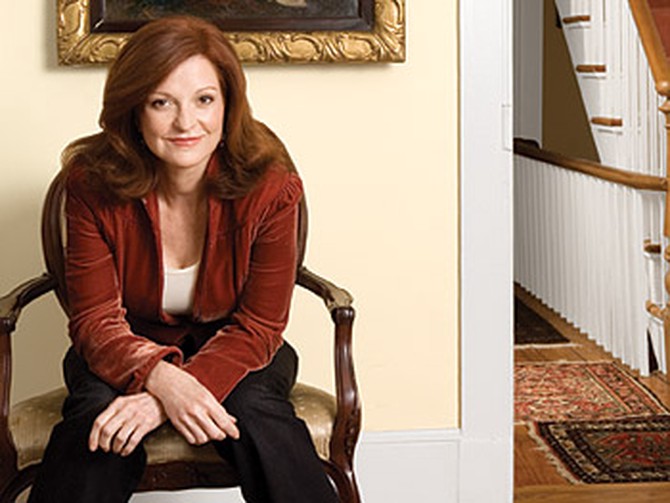
Photograph by Michael Arnaud, styling by Rebecca Omweg
The 1819 building was the first Maureen Dowd saw when she went house hunting in 1995, and she fell for it immediately. There were the classic Georgetown details, including the six fireplaces, the wood floors, a pocket-size backyard, and what seemed like an endless number of rooms—two parlors, a den, a formal dining room, and three bedrooms. That President Kennedy lived there as a senator didn’t lessen its appeal to Maureen the political junkie. She bought it immediately.
"Other Georgetown houses are filled with things from the time they were built," Maureen says, seated in the living room of her 1819 Washington, D.C., townhouse. "But what can I do? This is what I like—romantic decorating touches."
"Other Georgetown houses are filled with things from the time they were built," Maureen says, seated in the living room of her 1819 Washington, D.C., townhouse. "But what can I do? This is what I like—romantic decorating touches."
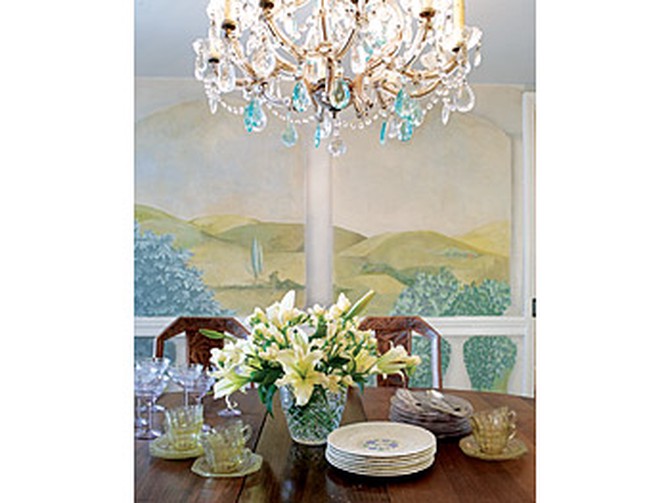
Photograph by Michael Arnaud, styling by Rebecca Omweg
Maureen asks for advice but never feels compelled to follow it. "I’d rather have things that tell stories about my life than have a decorator’s bland taste superimposed on me, even if I go over the top at times with too many leopard-print pillows," she says.
In the dining room, a previous resident had painted a mural of a porch overlooking rolling hills. "Paint over!" a friend ordered. But Maureen decided the mural would stay, and she colored the rest of the room’s walls a complementary sea green. Maureen also accessorized her home with several crystal chandeliers. The Depression-era glass and china came from her mother, Peggy Dowd, who died in 2005.
In the dining room, a previous resident had painted a mural of a porch overlooking rolling hills. "Paint over!" a friend ordered. But Maureen decided the mural would stay, and she colored the rest of the room’s walls a complementary sea green. Maureen also accessorized her home with several crystal chandeliers. The Depression-era glass and china came from her mother, Peggy Dowd, who died in 2005.
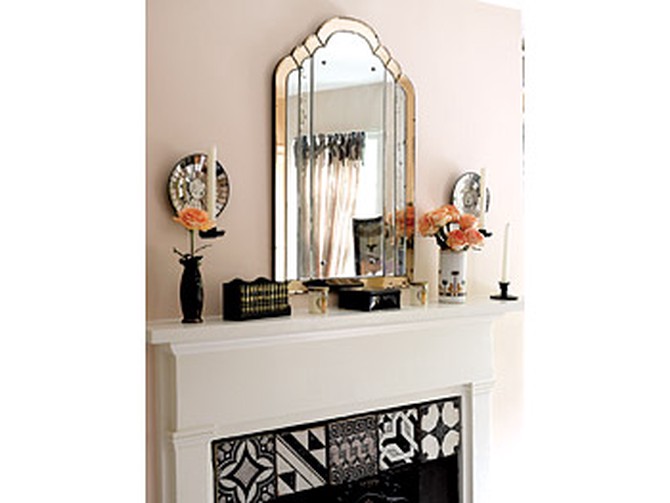
Photograph by Michael Arnaud, styling by Rebecca Omweg
After a contractor encouraged her to paint everything white, she went in the opposite direction. Almost every room is wrapped in color. Her bedroom, which is the peach of a starlet’s lingerie, is furnished with her great-aunt’s dressing table, an iron bed from the 1800s, and a painted bureau. The tiles on the fireplace in Maureen's bedroom, like many pieces in her home, are souvenirs—in this case, from a trip to Tuscany.
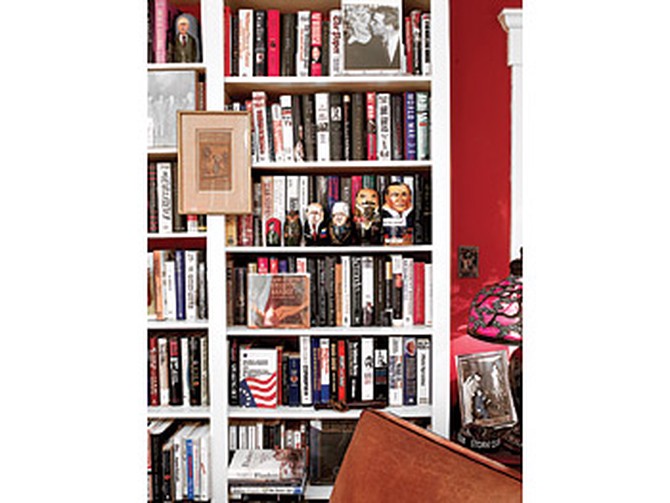
Photograph by Michael Arnaud, styling by Rebecca Omweg
Maureen's favorite spot is the second-floor den, whose walls match the blood in a French poster for the 1948 Maureen O'Sullivan movie The Big Clock. "It's a bit macabre," she says, smiling slyly. That's what gives the house's prettiness an edge: Maureen loves old films, but she goes for the dark melodrama, not the fluffy musical. "I love the style of film noir," she says. "The women were always Trouble with a capital T, and the guys said things like ‘quite the hacienda.' The clothes are sleek and sumptuous; the mood is sexy and mysterious."
Then there are her ironic minutiae—collections upon collections (like the Russian nesting dolls from Times reporters), much of them movie-related, the rest anything that combines fantasy and femininity. Maureen's shelves are filled with images of glamour girls like Brigitte Bardot, and the Marilyn Monroe and Joe DiMaggio wedding-day photo that got a New York Times editor demoted in 1954 on account of the movie star's sexily parted lips.
And everywhere are books (her favorites are by Jane Austen and Edith Wharton). No wonder West Wing creator Aaron Sorkin, whom Maureen once dated, told New York magazine that her house was "a cross between the New York Public Library and the House of the Rising Sun."
Then there are her ironic minutiae—collections upon collections (like the Russian nesting dolls from Times reporters), much of them movie-related, the rest anything that combines fantasy and femininity. Maureen's shelves are filled with images of glamour girls like Brigitte Bardot, and the Marilyn Monroe and Joe DiMaggio wedding-day photo that got a New York Times editor demoted in 1954 on account of the movie star's sexily parted lips.
And everywhere are books (her favorites are by Jane Austen and Edith Wharton). No wonder West Wing creator Aaron Sorkin, whom Maureen once dated, told New York magazine that her house was "a cross between the New York Public Library and the House of the Rising Sun."
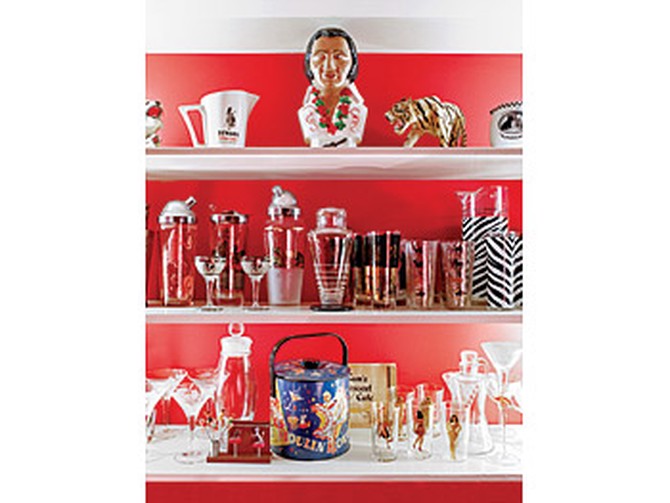
Photograph by Michael Arnaud, styling by Rebecca Omweg
You can't help but see how this sharp-tongued, funny, pop-culture-savvy, champion-of-women toys with images of herself. In her den, the columnist who famously said "Wooing the press is an exercise roughly akin to picnicking with a tiger … [and] the tiger always eats last" displays a streak of tiger collectibles and jokes that "maybe the house needs a cub running around, like the one Katharine Hepburn had in Bringing Up Baby," her 1938 movie with Cary Grant.
Many of the pieces came from friends; an Elvis statue from historian Michael Beschloss watches over a conga line of cocktail shakers. "I know I should get rid of stuff, but it all has, like, different memories," she says. "I've been collecting my whole life, from flea markets, secondhand stores, and trips with presidents. I'm always dragging weird stuff through customs." Just a few months ago, she brought home a falcon trap from Saudi Arabia.
Many of the pieces came from friends; an Elvis statue from historian Michael Beschloss watches over a conga line of cocktail shakers. "I know I should get rid of stuff, but it all has, like, different memories," she says. "I've been collecting my whole life, from flea markets, secondhand stores, and trips with presidents. I'm always dragging weird stuff through customs." Just a few months ago, she brought home a falcon trap from Saudi Arabia.
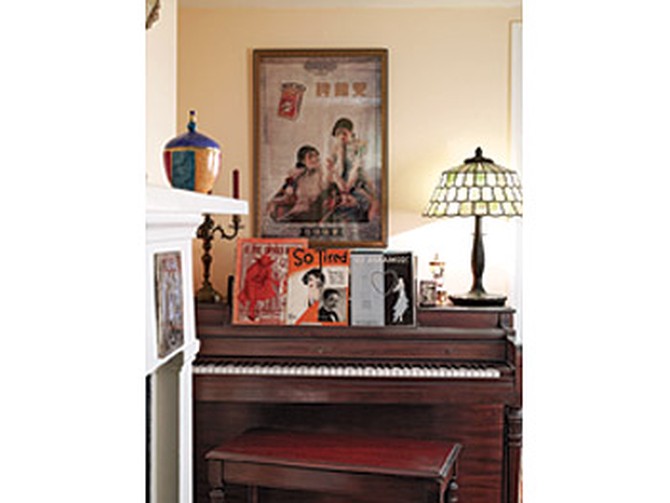
Photograph by Michael Arnaud, styling by Rebecca Omweg
Maureen keeps the upright piano and vintage sheet music in JFK's old bedroom. Among the memorabilia are small treasures from her beloved parents, Peggy and Mike Dowd. While she didn't inherit major furniture from them, she has more personal items, including a silver flask and a billy club from her policeman father, who died in 1971, and a framed twenties-era photograph of her mother, Peggy, dressed as a flapper. "I got her skin—that's better than a million dollars," Maureen says, acknowledging an unmistakable resemblance. It's clear she left her daughter her spirit and sense of style, too.
The paperback edition of Maureen Dowd's book Are Men Necessary? came out in October, 2006.
The paperback edition of Maureen Dowd's book Are Men Necessary? came out in October, 2006.
From the Winter 2006 issue of O, The Oprah Magazine

